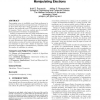Free Online Productivity Tools
i2Speak
i2Symbol
i2OCR
iTex2Img
iWeb2Print
iWeb2Shot
i2Type
iPdf2Split
iPdf2Merge
i2Bopomofo
i2Arabic
i2Style
i2Image
i2PDF
iLatex2Rtf
Sci2ools
ATAL
2006
Springer
2006
Springer
Junta distributions and the average-case complexity of manipulating elections
Encouraging voters to truthfully reveal their preferences in an election has long been an important issue. Previous studies have shown that some voting protocols are hard to manipulate, but predictably used NP-hardness as the complexity measure. Such a worst-case analysis may be an insufficient guarantee of resistance to manipulation. Indeed, we demonstrate that NP-hard manipulations may be tractable in the average-case. For this purpose, we augment the existing theory of average-case complexity with new concepts; we consider elections distributed with respect to junta distributions, which concentrate on hard instances, and introduce a notion of heuristic polynomial time. We use our techniques to prove that a family of important voting protocols is susceptible to manipulation by coalitions, when the number of candidates is constant. Categories and Subject Descriptors F.2 [Theory of Computation]: Analysis of Algorithms and Problem Complexity; I.2.11 [Artificial Intelligence]: Distribut...
ATAL 2006 | Complexity Measure | Important Voting Protocols | Intelligent Agents | Voting Protocols |
Related Content
| Added | 20 Aug 2010 |
| Updated | 20 Aug 2010 |
| Type | Conference |
| Year | 2006 |
| Where | ATAL |
| Authors | Ariel D. Procaccia, Jeffrey S. Rosenschein |
Comments (0)

